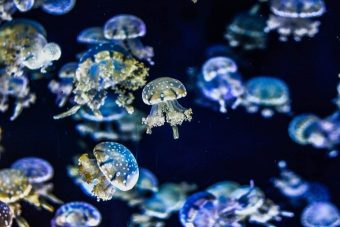
Jellyfish are not exactly the centerpiece of most people’s ideal meals. The umbrella-shaped animals are slimy, tasteless, and can be extremely poisonous.
But a population boom and the need to reduce meat — and other foods that require extensive energy to produce — consumption, means humanity has to get creative when it comes to making lunch. It turns out jellyfish are a prime candidate to become a staple food of the future, because there are plenty of them in the ocean. As overfishing reduces more traditionally available seafood stock, jellyfish reproduce in swarms. And there will be even more jellyfish thanks to climate change making oceans warmer and more acidic.
The solution to swarms of jellyfish? Learn to like eating them as they are. Or turn them into something more appetizing than a salty, rubbery gelatin. Like chips, for example.
A team of Danish researchers devised a method to turn the animals into crunchy chips in just a few days. This is in stark contrast to traditional means of preparing jellyfish that many Asian nations use — marinading the tentacled creatures for weeks in salt and potassium. Pickled jellyfish, anyone?
Using two-photon microscopes, the Danish team studied how the filaments that make up a jellyfish change when the animals turn from rubbery and soft to hard and crunchy. The scientists just presented their study at the 62nd Biophysical Society Annual Meeting in San Francisco, California.
Mathias P. Clausen, a postdoctoral fellow at University of Southern Denmark in Odense, Denmark, involved in the study said in a press release: “Tasting jellyfish myself, I wanted to understand the transformation from a soft gel to this crunchy thing you eat. Using ethanol, we have created jellyfish chips that have a crispy texture and could be of potential gastronomic interest.”
Jellyfish chips are not only an acceptable alternative to potato chips taste-wise, but they’re also good for you. These creatures are rich in nutrients, including vitamin B12, magnesium, and iron, and low in calories.
And the sooner we learn to co-opt these creatures into acceptable food sources, the better. According to the Food and Agriculture Organization, we could see “a global regime shift from a fish to a jellyfish ocean” within our lifetimes. Fishermen can’t wait to get rid of them either, because jellyfish also endanger fish stocks around the world.
It may be time to take the mentality: “If you can’t beat them, eat them.”
Source: Futurism

